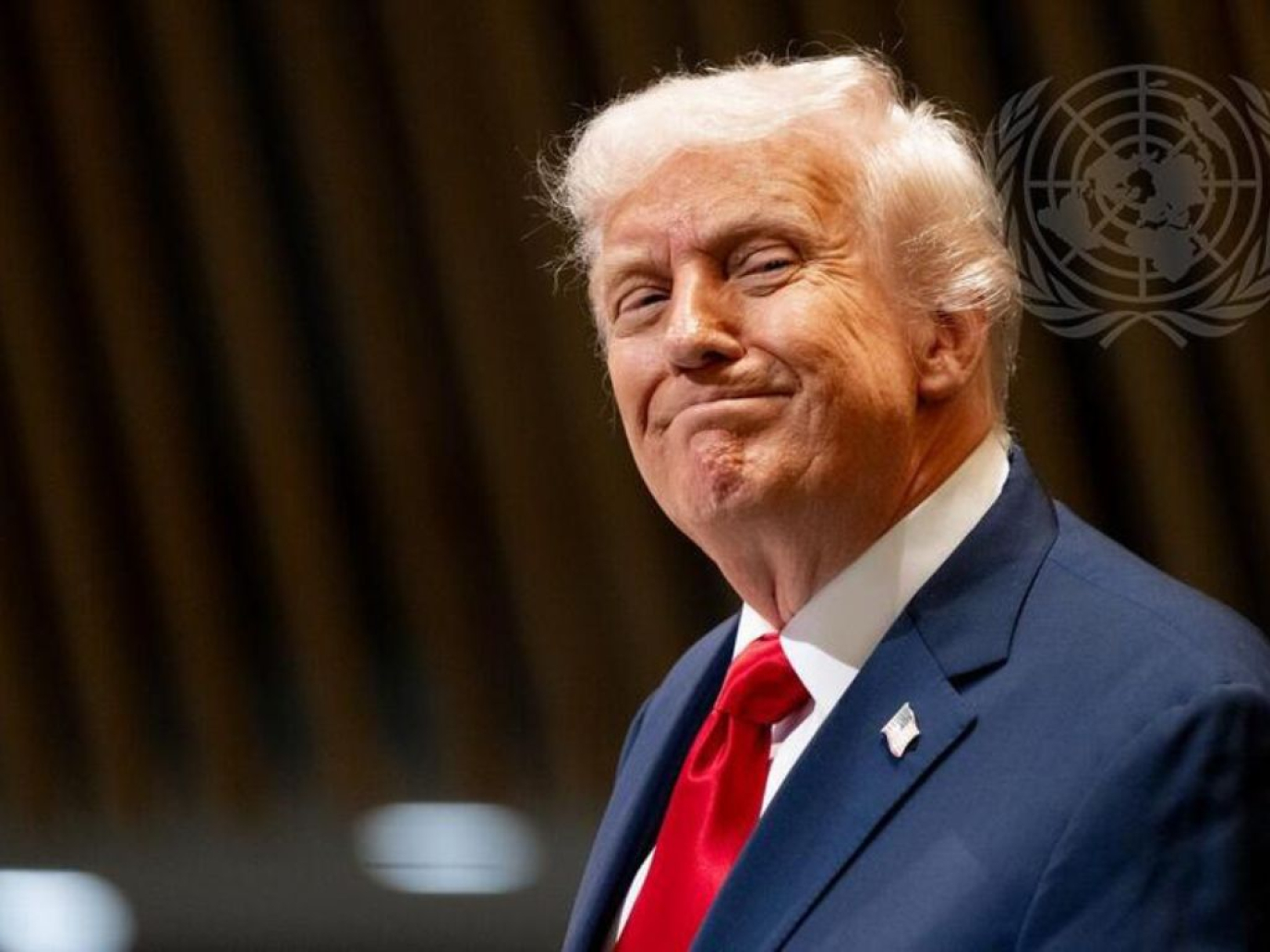This article is also available in Italian / Questo articolo è disponibile anche in italiano
from New York - “Climate change is the biggest con job ever.” “Renewables are a joke, they don't work.” “Wind energy is pathetic, wind turbines rust and rot, they are the most expensive source of energy, the government has to subsidise them, and they are almost all manufactured in China.”
Donald Trump's 55-minute speech at the United Nations General Assembly (compared to the 15 minutes allowed to each head of state) shocked delegates and observers with its denialist stance, its continuous assault on Europe (“your country is going to hell”) and his total contempt for the United Nations as an organisation (“even your escalators don't work”).
After rattling off a series of inaccurate figures on the state of the American economy, he then spent most of his speech attacking climate change and economic transition, targeting Europe in particular (“brought to its knees by clean energy and immigration”).
He praised American gas, oil and even coal (which he called, in his usual superlative terminology, “beautiful clean coal”), that “have lowered Americans’ bills”. Contrary to this claim, US household electricity bills have soared by 10% nationally since Trump took office and are set to rise further, according to a press release from GSCC Network, an organisation specialising in climate communication.
“The last thing we needed was a denialist speech in 2025,” grimly remarked a delegate as they exited the UN building, requesting their name not be published. Someone in the press room was spotted quickly sticking up their middle finger at the screens broadcasting the president’s speech live.
To describe Trump's speech as “denialist” is almost an understatement. One of the most memorable lines was “the carbon footprint is a hoax made up by people with evil intentions”, a statement that is actually partly true, as GSCC spokesperson Nicola Flamini ironically points out in a note, given that the concept was created by the oil company British Petroleum. Immediately afterwards, the American President reminded Europeans that “the atmosphere is a free space” and that China is now responsible for the entire carbon footprint [the United States is the country with the highest cumulative emissions, ed.].
This statement was criticised by many, yet the Italian government did not dissociate from it. In the mid-morning, the Italian press met with Prime Minister Giorgia Meloni for a meeting that lasted less than four minutes. When questioned by a reporter on the climate issue, the prime minister reiterated that she agrees with much of what Trump said about the Green Deal. Unfortunately, there was no room to elaborate on the statement, given the very brief time allotted to the press in New York.
Climate summit: Lula calls for reforms
The opening speech by Brazilian President Luiz Inácio Lula da Silva was in a completely different vein. “All over the world, anti-democratic forces are trying to subjugate institutions and stifle freedoms. They adore violence, glorify ignorance, act as physical and digital militias and restrict the press,” said Lula. He stressed the urgency of having leaders who bring a new vision against authoritarianism, environmental degradation and exclusion. This was a not-so-subtle jab at the US president, in retaliation for his interference in the Bolsonaro case and the exorbitant tariffs imposed.
Interesting is the section where the Brazilian president referred to the need to bring the United Nations Framework Convention on Climate Change (UNFCCC) back to the heart of the United Nations General Assembly as a “fundamental reform” that has been long awaited. The new council within the Assembly itself, with the power to monitor the consistent implementation of the Paris Agreement, will be necessary to outline the next step in climate multilateralism when the populist right’s revanchist interlude is over.
This is certainly not a simple format, given that “its first implication would be to overcome the current consensus method of one seat, one vote, given that in the UNGA decisions are passed either by simple majority or by two-thirds majority,” commented Luca Bergamaschi, co-founder of Ecco. Not only that: Lula has relaunched the strengthening – indeed, a veritable reshaping – of the WTO, the World Trade Organisation, against unilateral and protectionist trade measures, a proposal that confirms the Brazilian president's social-liberal shift.
We will now have to listen to the speeches of the heads of state at the Special High-Level Event on Climate Action to see whether the anti-decarbonisation wind is still blowing strong. Ahead of COP30 in Brazil, all Parties to the Paris Agreement must submit new nationally determined contributions (NDCs) that reflect their action plans for the next decade.
If Europe reaffirms what has already been approved by the Environment Council (a European interim emission reduction target of between 66.25% and 72.50% in 2035 compared to 1990), we will need to listen closely to what China proposes. Important messages will also arrive regarding the necessary reform of the UNFCCC and the United Nations in general.
Messages in UN jargon that will serve to reach October 15, when Secretary-General Guterres will present in detail the long-awaited proposal for reforms and redefinition of the UN budget, based on the document Shifting Paradigms: United to Deliver.
Climate Week NYC 2025 in New York City
Meanwhile, ahead of today's high-level climate summit, which should finally clarify the mood in Belém for COP30, the city is buzzing with excitement for Climate Week NYC 2025. Over 1,000 events are scheduled across New York's five boroughs.
Given the number of participants and initiatives, it is shaping up to be the largest American event focused on transition ever, with presentations, round tables, exhibitions, networking events and much more, involving non-profit organisations, companies, philanthropists and activists, all intent on promoting climate action in every sector of the economy and society. A packed schedule, put to the test by logistics slowed down by crazy traffic.
One of the most popular events is The Nest Climate Campus 2025, the official platform and headquarters for Climate Week NYC activities, conceived as a climate campus that combines events, talks, workshops, immersive experiences and networking under one green roof. From 23 to 25 September 2025, at the Javits Centre in New York, The Nest will host the Main Stage with talks of all kinds, held by external parties but located on campus, and the Climate Collective section with experiential events “aimed at stimulating reflection, innovation and collaboration”.
Another noteworthy event is the unveiling of the Climate-related Financial and Macroeconomic Risk Initiative (CFMRI), a collaborative research platform dedicated to analysing the risks that climate change poses to global financial and macroeconomic objectives. The platform is coordinated by the Salata Institute for Climate and Sustainability at Harvard University and the Washington-based think tank Resources for the Future (RFF). There are countless events organised by corporations, various communities in the city and creative collectives.
An important signal in a New York more vibrant than ever, responding to its own president by reminding him why it remains essential to take action to transform the economy.
Cover: UN Photo/Evan Schneider



